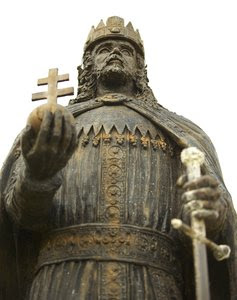The Holy and Righteous One
The Holy and Righteous One
The God of Abraham, the God of Isaac, and the God of Jacob, the God of our fathers, glorified his servant Jesus, whom you delivered over and denied in the presence of Pilate, when he had decided to release him. But you denied the Holy and Righteous One, and asked for a murderer to be granted to you, and you killed the Author of life, whom God raised from the dead. To this we are witnesses. Acts 3:13-15 (ESV)
To this point in Luke's book of Acts of the Apostles, Jesus has been named Lord and Christ. In his second great instance of preaching, Peter is speaking to Jews at the temple. They've all gathered in amazement, responding to the miraculous healing of a lame man. Peter is even more descriptive of the glory of Jesus.
Peter begins by calling upon the Almighty God, using references that are most meaningful to devout Jews: "The God of Abraham, Isaac and Jacob, the God of our fathers."
Then, Peter describes Jesus as the Servant of this Great God of the Jews.
SERVANT: pais (a boy or girl, a child, a slave or servant, especially a a minister to a king); from "paio" (to hit or sting, as a scorpion)
The Greek word for servant originated with the word for a sting. An inattentive servant, especially a young boy or girl, was effectively brought back to task with a stinging flick of a cane or strap. Parents used similar discipline to correct their children. Literally, parents and masters referred to children as "They-Which-Need-A-Spanking"!
This was the word used to describe Jesus.
But in God's view, this Servant was His Chosen and Beloved:
Behold my servant, whom I uphold, my chosen, in whom my soul delights; I have put my Spirit upon him." Isaiah 42:1 (ESV)
Matthew later quotes the prophet Isaiah in direct connection with Jesus:
Behold, my servant whom I have chosen, my beloved with whom my soul is well pleased. I will put my Spirit upon him." Matt 12:18 (ESV)
Servanthood is closely connected with the ceremony of anointing with oil. Luke will later describe Jesus as God's "holy servant" whom God anointed:
The kings of the earth set themselves, and the rulers were gathered together, against the Lord and against his Anointed - for truly in this city there were gathered together against your holy servant Jesus, whom you anointed." Acts 4:26-27 (ESV)
Luke was quoting King David, writing prophetically of Jesus in Psalms 2.
To be a servant of God is radically different and gloriously more wonderful than to be a servant of an earthly king.
What do you think? Consider the work of which some servants in our society must do: cleaning toilets and sewers, lifting and washing the elderly, washing dishes, dumping garbage and more. In what sense has Jesus gladly endured menial work that has resulted in great glory?
Holy and Righteous One
"But you denied the Holy and Righteous One." Acts 3:14 (ESV)
HOLY: hagios (sacred, pure, blameless, religious or consecrated); from hagos (an awful thing)
RIGHTEOUS: dikaios (equitable, innocent, holy); from dike (self-evidently right, justice); from deiknyo (to show)
Jesus is not one of the many holy and righteous people who have ever lived...Jesus is The Holy and Righteous One. There is no other. This phrase is the same as saying that Jesus is God, and no other person can claim that.
The Jews who saw Jesus in the flesh saw Him as worthless, less valuable even than a murderer. They denied Him, speaking of him as a non-person, negating any claim to esteem or value Him. They preferred a criminal to the Christ.
What do you think? Meditate for a moment on the meaning of the words holy and righteous. Imagine a typical day for you, from waking up, through your day, and to the moment of laying down to sleep. In what does it make a difference for you that Jesus is, and always has been, and always will be, completely and utterly holy and righteous?
The Author of Life
"You killed the Author of life, whom God raised from the dead." Acts 3:15 (ESV)
The King James Version translates Author as "Prince."
AUTHOR: archegos (a chief leader); from arche (a commencement or chief) and ago (to lead, bring, drive, go, pass, induce); from archomai (to commence); from archo (to be first in rank or power)
"Author" does not seem to convey the full meaning of the Greek word. Even the word "prince" conveys something less. In my mind, "prince" brings an image of a rich, obscenely good-looking, self-indulgent high-society celebrity in whom the king is deeply disappointed or despairing of ever amounting to anything. I think I've seen too many animated movies!
The Greek word means the chief leader. Not merely one leader amongst many, but The One Chief Leader. Jesus is the One Who leads, the One Who is First in esteem and power.
Jesus is the Great Leader of All Life.
This is why God raised the Man Jesus from the dead. Jesus the Man was Jesus the Utterly Holy and Righteous One, the Leader of All Life, the Beloved Servant of God. No grave could contain Him!
Jesus is not a long-dead symbol of a religious tradition that seeks to control and form society.
Jesus is not merely one of many good people who have captured the hearts of people of little minds.
Jesus is God. He is God in human form, invested with all righteousness, holiness, power, and sovereignty.
This is the One of Whom we are witnesses.
What do you think? What distinguishes biblical Christianity from all other religions?
Image courtesy of Zsolt Zatrok




Comments
Post a Comment